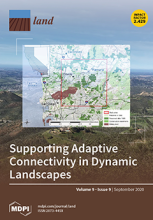Land Library
Welcome to the Land Portal Library. Explore our vast collection of open-access resources (over 74,000) including reports, journal articles, research papers, peer-reviewed publications, legal documents, videos and much more.
/ library resources
Showing items 1 through 9 of 28.The rise of urban populations has rendered cities in both developed and developing countries vulnerable to poor health and diseases that are associated with urban living conditions and environments.
Informal settlements represent a challenging operational context for local government service providers due to precarious contextual conditions.
We examined the associations between social capital and rural households’ perceptions toward social, economic, and environmental benefits of forest carbon sequestration projects by employing the proportional odds model based on data collected from a rural household survey in Sichuan and Yunnan Pr
In an era of global warming, long-standing challenges for rural populations, including land inequality, poverty and food insecurity, risk being exacerbated by the effects of climate change.
The 2019 fire crisis in Amazonia dominated global news and triggered fundamental questions about the possible causes behind it. Here we performed an in-depth investigation of the drivers of active fire anomalies in the Brazilian Amazon biome.
Existing studies on blockchain within land administration have focused mainly on replacing or complementing the technology for land registration and titling.
Economic theory notes tenure security is a critical factor in agricultural investment and productivity. Therefore, several African countries’ development initiatives enabled land titling to enhance tenure security.
Over-fertilization has caused serious environmental problems and high agricultural production costs at the household level in China. This study attempts to analyze the effects of grape growers’ fertilization knowledge and technologies on their over-fertilization behavior.
To investigate the rural labor transfer effects of China’s Collective Forestland Tenure Reform (CFTR), we employ binary probit models by using survey data of 694 households from China’s northern collective forest areas.



